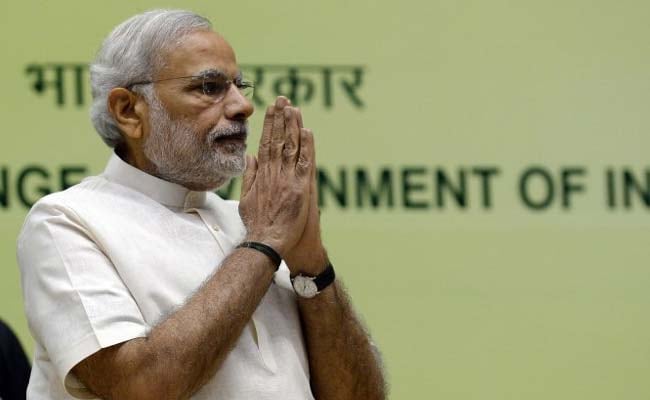
File photo of Prime Minister Narendra Modi.
New Delhi:
A surprise delay to India's first nationwide sales tax marks a major setback for Prime Minister Narendra Modi's government as it nears the end of its first year in power with markets falling and farmers braced for a poor monsoon.
Investors had hoped that the ruling BJP's strong majority in the Lok Sabha would ensure key reforms are pushed through smoothly, but that assumption has taken a battering.
On Tuesday, the government submitted to strong opposition in the Rajya Sabha, the upper house, where it is in a minority, by agreeing to delay the landmark tax legislation until at least July. It is being reviewed by a committee of Rajya Sabha members.
The introduction of the goods and service tax (GST) would constitute India's biggest tax reform since independence.
The GST would replace a patchwork of levies by the central and state governments, reducing corruption, attracting investment and - according to Finance Minister Arun Jaitley - add 2 percentage points to India's growth.
Senior officials said on Wednesday they feared the delay could become yet another "sell" signal for foreign funds, already angered by the government seeking to tax them for several years of previously untaxed gains.
The government could still implement GST from April 2016, if the reform is passed when parliament reconvenes in July.
India was Asia's second best performing market last year and the government has scored some significant successes. It has improved its finances, held successful telecom and coal block auctions, and allowed more foreign investment into the insurance and defence sectors.
But the shine is wearing off, say analysts. Foreign investors sold nearly $2.2 billion or 14,000 crores in shares during the last 16 trading sessions.
On Wednesday, HSBC became the first major foreign bank since last year's market rally to downgrade India, cutting its rating on Indian shares to "underweight" from "overweight". It cited weakening earnings forecasts and little sign of a recovery in capital expenditure.
Another key reform - the controversial land acquisition bill which changes the rules for the acquisition of farmland - has been sent to a joint parliamentary committee after the government was blocked by a united opposition from introducing it in the Rajya Sabha.
Investors had hoped that the ruling BJP's strong majority in the Lok Sabha would ensure key reforms are pushed through smoothly, but that assumption has taken a battering.
On Tuesday, the government submitted to strong opposition in the Rajya Sabha, the upper house, where it is in a minority, by agreeing to delay the landmark tax legislation until at least July. It is being reviewed by a committee of Rajya Sabha members.
The introduction of the goods and service tax (GST) would constitute India's biggest tax reform since independence.
The GST would replace a patchwork of levies by the central and state governments, reducing corruption, attracting investment and - according to Finance Minister Arun Jaitley - add 2 percentage points to India's growth.
Senior officials said on Wednesday they feared the delay could become yet another "sell" signal for foreign funds, already angered by the government seeking to tax them for several years of previously untaxed gains.
The government could still implement GST from April 2016, if the reform is passed when parliament reconvenes in July.
India was Asia's second best performing market last year and the government has scored some significant successes. It has improved its finances, held successful telecom and coal block auctions, and allowed more foreign investment into the insurance and defence sectors.
But the shine is wearing off, say analysts. Foreign investors sold nearly $2.2 billion or 14,000 crores in shares during the last 16 trading sessions.
On Wednesday, HSBC became the first major foreign bank since last year's market rally to downgrade India, cutting its rating on Indian shares to "underweight" from "overweight". It cited weakening earnings forecasts and little sign of a recovery in capital expenditure.
Another key reform - the controversial land acquisition bill which changes the rules for the acquisition of farmland - has been sent to a joint parliamentary committee after the government was blocked by a united opposition from introducing it in the Rajya Sabha.
Track Latest News Live on NDTV.com and get news updates from India and around the world

